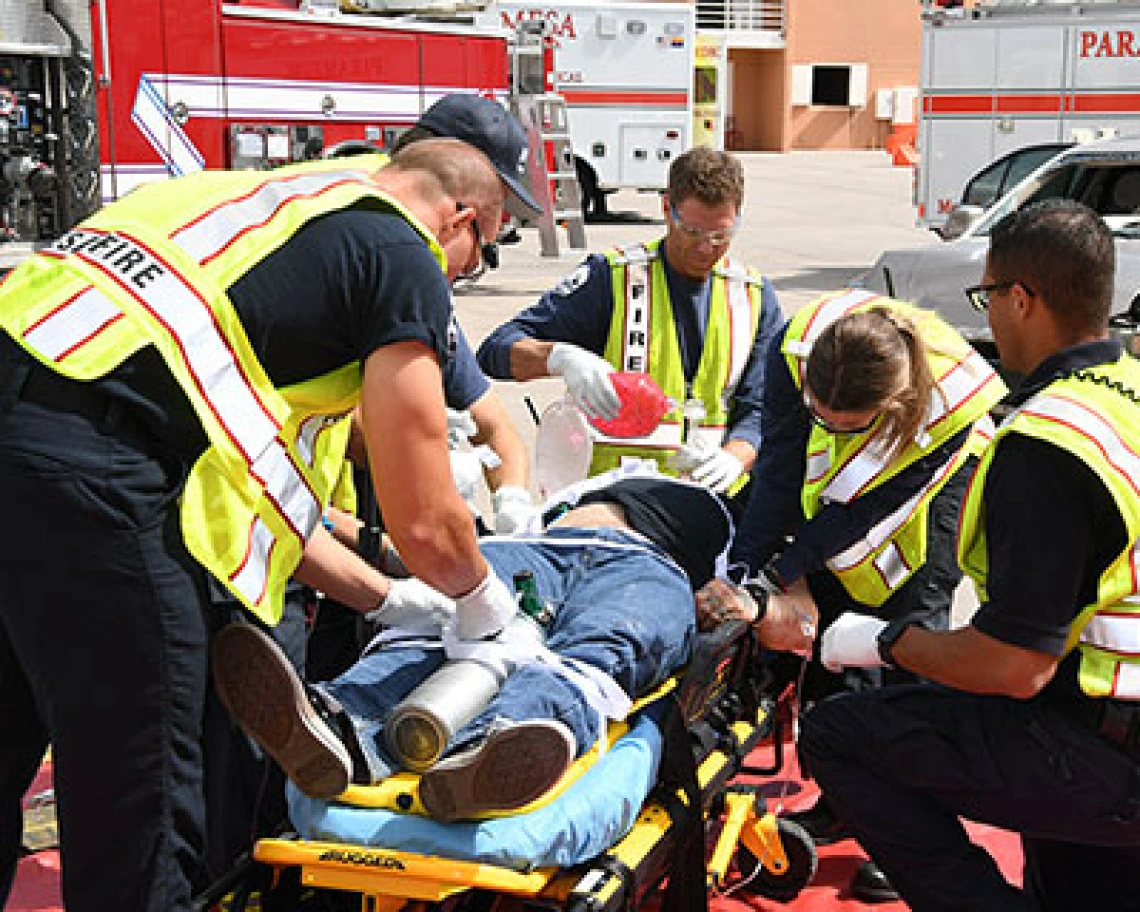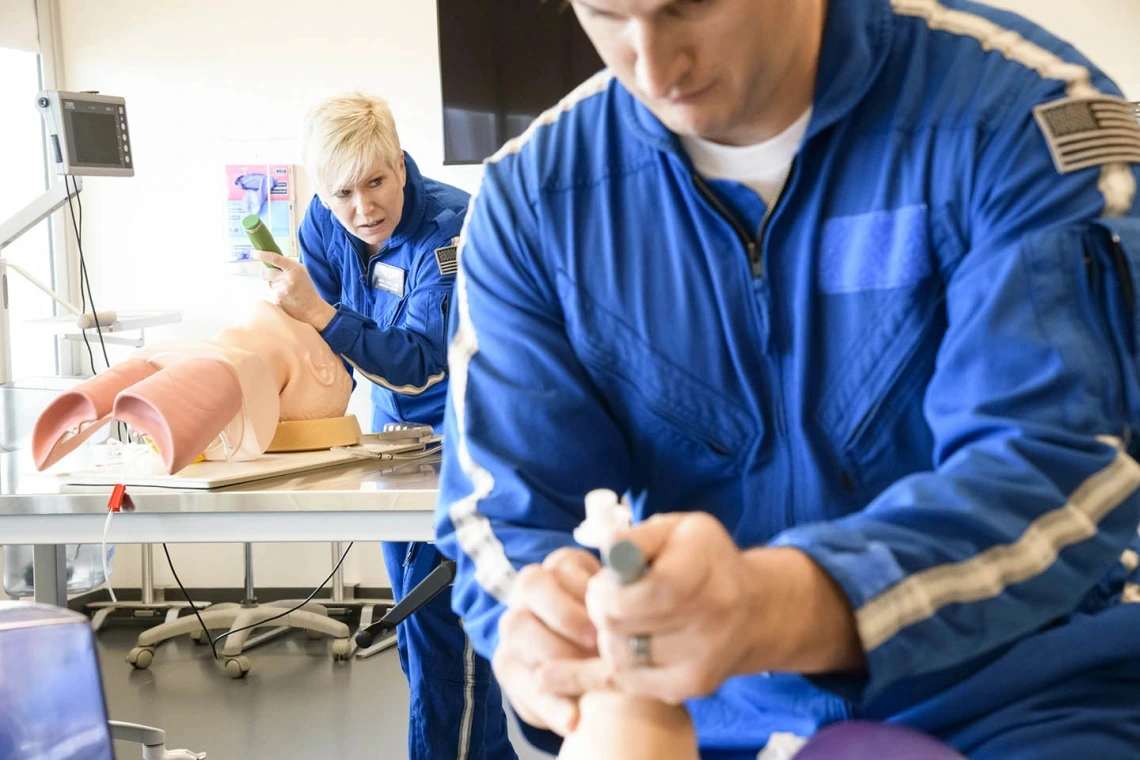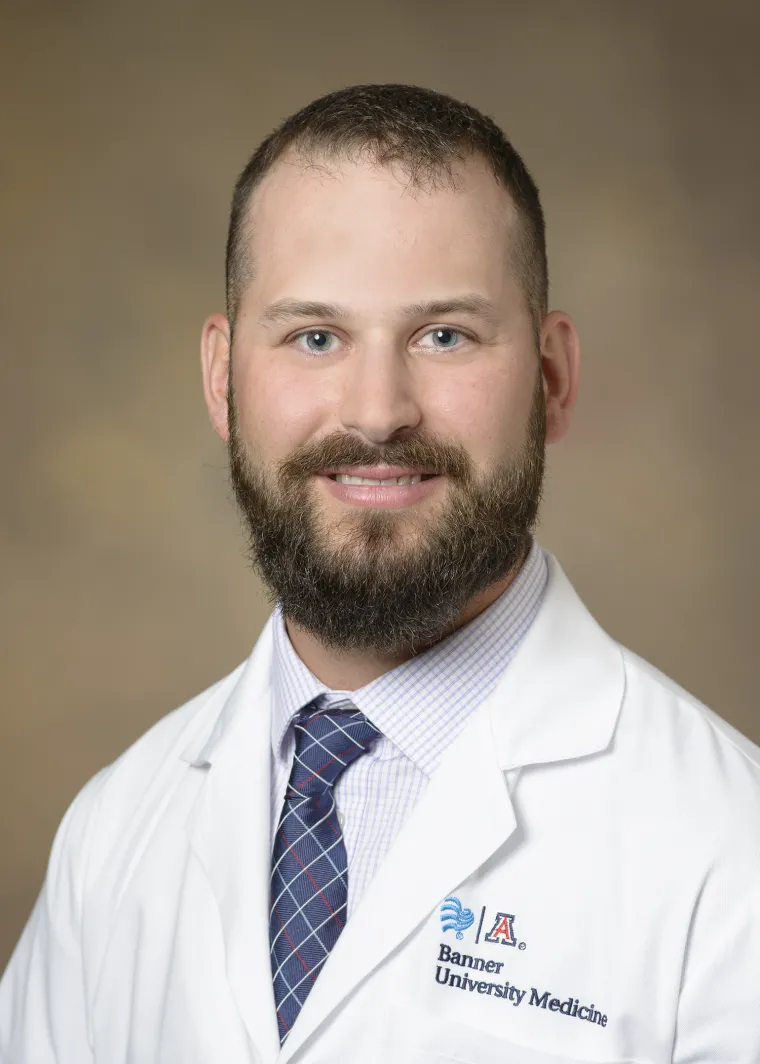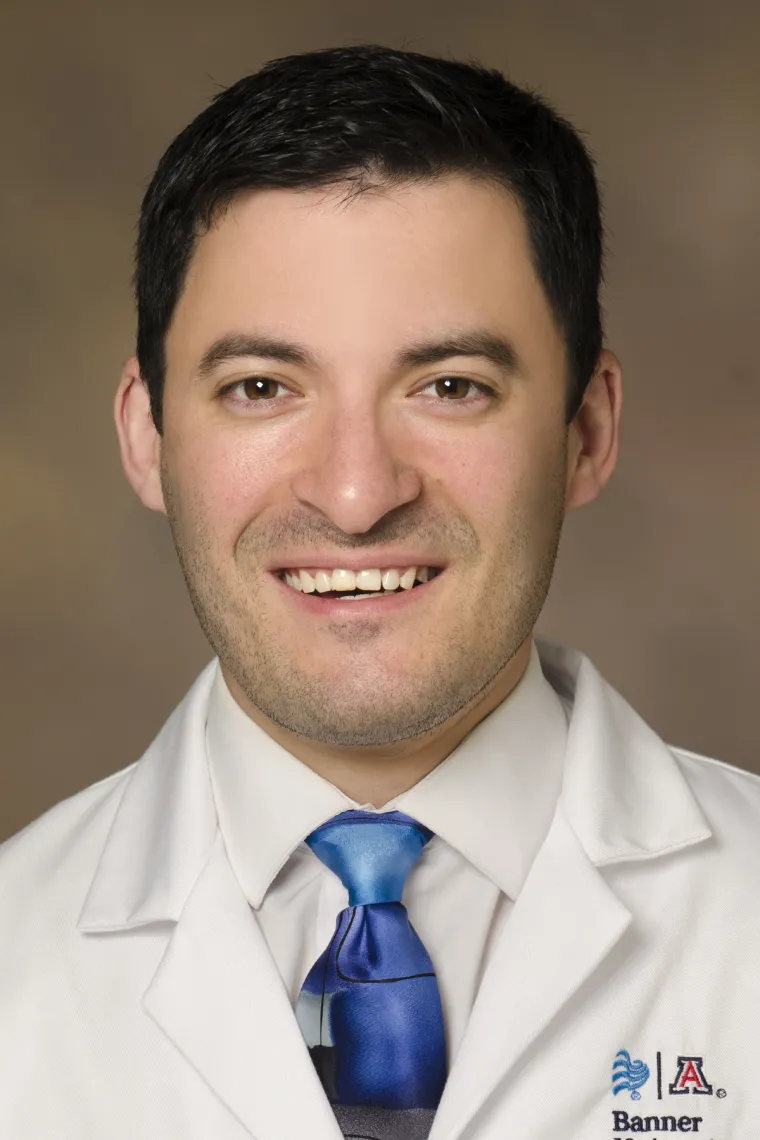Bachelor of Science in Emergency Medical Services
Do you want a degree that trains you and elevates your knowledge for an exciting health care career? If so, the BS in EMS is for you.
The Bachelor of Science in Emergency Medical Services takes paramedics to the next level of clinical care and equips them with the background necessary to become leaders in their field. Coursework meets the unique educational needs of the practicing paramedic and builds on prior paramedic education by providing the basic science background necessary to adapt to the ever-changing medical field. Graduates are prepared to understand the full range of subspecialty EMS roles with advanced clinical knowledge and leadership skills to succeed in the health care industry.
There are two pathways to join the BS in Emergency Medical Services (EMS). Certified paramedics complete the degree through Arizona Online while working in the field. Aspiring EMS professionals who choose to study through main campus in Tucson are able to complete EMT and paramedic certifications while completing this degree.

The program is offered on the University of Arizona main campus and Arizona Online. Learn more about the program, the required courses, and potential career paths.

Find EMS course descriptions in the University of Arizona Course Catalog.

Students holding a current NREMT certification can find additional clinically focused study and experience by completing a minor in EMS. See the U of A Course Catalog for an overview and course requirements.

Learn about EMT coursework, the paramedic program, graduate certificates and continuing education opportunities.
Student Pathway for Applied Research & Coordination (SPARC)
Students can enroll in the certificate program in Clinical Research Coordination, which provides foundational knowledge for students to work as clinical research coordinators as well as a pathway to professional certification post-graduation with the Society of Clinical Research Associates (SOCRA). Students complete three EMD courses and a statistics course, building on the knowledge and experience gained to know how to work on clinical research studies in a critical care environment.
When completing the certificate, students also complete over 200 clinical/research hours in the Banner Emergency Department screening patients for active clinical studies, interact with ED health care providers, patients and researchers. Students will also learn the basics of using REDCap to enter and manage clinical data and create data visualizations for a scientific presentation.
Students must be able to gain access to the Banner scheduling system by proving immunization history, including COVID-19 and flu, pass a 10-panel drug test and tuberculosis test, as well as properly fit a mask on themselves. Hospital attire is required and available for purchase in the U of A Campus Store. There are costs to the above list ranging form $35 to more than $200 depending on how many of the items you’ve already completed and the recency of their completion. Help on this process is provided in the EMD courses. CPR card will be earned during the first course.
This program began as the Research Associate Program and operated under the Arizona Emergency Medicine Research Center for many years under the leadership of Dr. Kurt Denninghoff. It was a student-volunteer program in partnership with the Department of Biomedical Engineering, occurring before the Department of Emergency Medicine offered undergraduate coursework. The current certificate and course offerings are the evolution of this foundational work.
Academic Advising and Student Resources
Academic advising is a critical component to student success. Advisers are here to help you navigate your time as an undergraduate student at the University of Arizona. Beyond helping you plan your courses, they can help you connect to campus resources, clarify departmental and university policies, and partner with you to define and achieve your academic goals.
Online students
This program is designed to give certified paramedics additional subspecialty EMS clinical training as well as a foundation in the fundamental science, communications, math, leadership and health care systems knowledge they will need to be the leaders of tomorrow’s EMS systems.
Students enrolling in this program must hold a current national certification as a paramedic. We recognize that paramedic training includes a large amount of fundamental health care knowledge and practical skills, so we want to ensure that each student is given as much transfer credit as possible. Therefore, before starting this program, all potential students should email a program adviser who will identify any units that may be transferred from other institutions. Transfer units do not generally count for EMS selective units.
Main campus students
This program is designed to give aspiring EMS professionals the training needed to become an EMT and then a paramedic. Students arriving to main campus with EMT certification will prepare for paramedic training once those program pre-requisites are met. The rest of the program provides a foundation in the fundamental science, math, EMS subspecialty coursework and electives in communications, leadership, health care systems or more science courses in preparation for graduate study.
Students enrolling in this program do not need to already hold any EMS certification and will earn EMT and complete paramedic training before graduation. Paramedic training is a significant number of total units so students with double majors can receive some units for their paramedic study to count toward their major. Paramedic units do not typically count toward the major requirements but do count in the total for graduation.
Our academic advisors offer Zoom appointments throughout the week. Be sure to check their calendar in Trellis Advise for the most accurate availability! There are several options for advising.
Scheduled Appointments
- 30-minute appointments for currently declared majors or minors. Prepare ahead of time to get the most out of your time together!
- Available through Zoom or over the phone
- Our academic advisers typically post appointments two weeks at a time. If you don’t see any availability that works for you, contact us.
Email Advising
- You can email your academic adviser for any general questions you have.
- Use your official U of A email account and include your name, student ID number and your question. Read more about best practices for email.
- It can take 24-48 business hours to get a response, excluding holidays and priority registration.
No-Show Policy
You are considered a no show if you miss the first 15 minutes of your appointment. In the case of a Zoom appointment, the Zoom room will be closed for the remainder of your appointment and you will need to reschedule your appointment or email your adviser with your questions/concerns. This policy ensures that both you and your adviser have enough time to address all questions without being rushed and/or making your adviser behind schedule or late for subsequent appointments or drop-in.
If you’re late for an appointment, please email your adviser to let them know! Depending on the situation, they may recommend that you reschedule to ensure you have the full appointment time to connect on any questions/concerns you have.
Academic advising is a collaborative relationship between you and your academic adviser. The intent of this relationship is to assist you in developing meaningful education goals consistent with your interests, values and abilities.
We strongly recommend you meet with your academic adviser at least once a semester to discuss your plans, assess progress toward your goals, and address any issues or questions you have. However, you’re welcome to connect with us as often as needed.
Student Expectations
- Seek advice from appropriate advisers at appropriate times.
- Learn academic program requirements.
- Use available resources to monitor academic progress.
- Take responsibility for actions and decisions that affect academic progress.
- Demonstrate respect for others and self at all times.
- Adhere to the University Student Code of Conduct, policies and procedures.
- Check university’s official email account multiple times per day during the regular fall and spring semesters.
Adviser Expectations
- Approve academic programs of study.
- Provide accurate and consistent information.
- Clarify program requirements and policies.
- Assist in identifying appropriate institutional resources.
- Uphold academic standards of the institution.
- Demonstrate respect for others and self at all times.
- Adhere to Family Educational Rights and Privacy Act (FERPA) guidelines.
- Respond within 24-48 business hours upon receipt of an email from a student’s university account.
Degree Program & Course Enrollment Forms
- Add Major, Change Major, Add Minor
- Unit Maximum Override Request
- Clinical Research Course Request
- Paramedic Training Application (U of A students)
Preparing for Future Education
Meet the Team
Ready to Apply?
Main Campus
- Term: Current term or term you’re searching for
- Campus: Main Campus
- Academic Career: Undergraduate
- Undergraduate Tuition Program: Guaranteed Tuition Program (semester started in)
- College, Program or Differential Tuition: College of Medicine – Tucson
- Residency: Arizona Domicile or Non-Arizona Domicile/International
Online Campus
- Term: Current term or term you’re searching for
- Campus: Arizona Online
- Career: Undergraduate
- College: UA Online Undergraduate
- Residency: Either (rate is the same)
Find out how much tuition will cost using the UA Tuition Calculator. To receive financial aid, you will need to complete your FAFSA application.
























